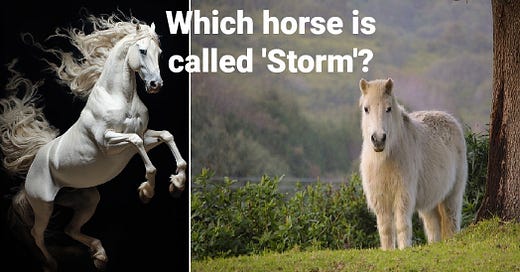Language matters!
When we use words, they make images in our brain. Those images can evoke positive or negative 'feelings'. Language matters: when we call our horse 'Storm'...
…, do you immediately think of a calm, compliant and trustworthy horse? Or do you picture a chaotic, energetic horse?
Wording in animal training
Do you want to catch your horse in the field or would you like to go get your horse? The word ‘catch’ reminds me of some kind of struggle that involves chasing the horse or tricking him with a carrot bribe.
Catch pen or Training pen?
In llama training people often use a ‘catch pen’. The catch pen is a very small area, usually it’s just 4 fence panels that you then can drive (or chase) the llama in. Once he’s in, you can easily ‘catch’ (halter) him. Llamas often ‘freeze’ and will stand in panic. People found that you can take advantage of that behaviour by driving them into a corner and halter them against their will.
Here is an example of how a ‘catch pen’ works. Turn off the sound, because that calming music is really misleading. ;-)
I’d like to use the word “training pen” instead. I teach the llamas it’s OK to go in the training pen (which is the exactly the same 4 panels as a catch pen). I leave the gate open and they can come and go as they please. When they come in, they are positively reinforced by something valuable: some food they like. Over a few sessions they get reinforced when I close the gate and they stand & relax, when I approach them to touch (first with the door open, later also closed). In the training pen training happens! The word training pen is a simple reminder that we need to train the animal to be calm and confident in the training pen. Good things are happening in the training pen!
Do you want a Broke Horse or a Well Trained Horse?
Breaking a horse is a term that’s used to indicate the horse is now ready to ride. The methods to break a horse is often to literally break his spirit by dominating the horse into submissiveness.
A so called ‘dead broke’ horse, is a horse that doesn’t respond to his environment with fear (but it doesn’t respond to anything). In animal training terms this is called ‘learned helplessness’. It’s a way for the horse to coop with his environment (humans) after realizing that he has no control or influence to what’s happening to him. It’s a sad phycological coping mechanism. A broke horse is never a happy horse.
Breaking a horse is a horrible term because it’s often literal! When I moved from The Netherlands (Europe) to Canada I was shocked to learn about some training methods that are (still) commonly used in North America, but would considered medieval in Europe. For example tying a horse up to a “patience pole” to “teach” him to be tied down. Sometimes the horse gets tied down for hours without food or water. When horses pull, they won’t break free. Eventually they give up the fight and ‘become good with being tied down’.
You can also put a little effort in teaching your horse not panic when they are tied down. Much safer for the horse.
What words don’t you like to use anymore? What alternative words do you use instead?
Happy Horse training,
Sandra Poppema, BSc
Train with kindness






